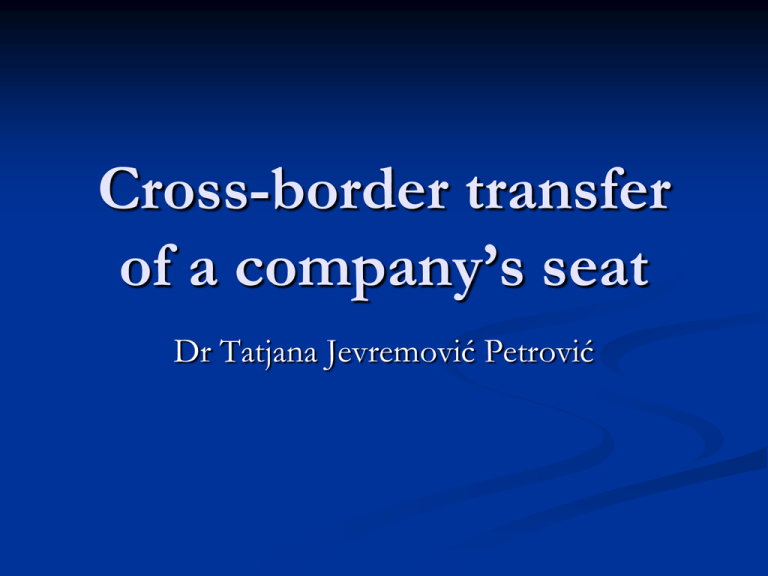
Cross-border transfer
of a company’s seat
Dr Tatjana Jevremović Petrović
Introduction
Regulated by national laws of MS (exception:
Statute for a SE)
National differences
Cross-border transfer of company’s seat was/is
not completely possible
Introduction
Incentives for a company’s change of seat
Economic reasons
Investment climate (state aid, investor protection...)
Tax law
Company Law issues (classes of shares, management
responsibilities and duties, employee representation, board
structure...)
Soft law issues: life standard for CEO, links for certain
activities (fashion in Milan, financial services in London)
Introduction
National law determines:
What is a seat – concept of company’s seat based on
company law
Relevance of company’s seat
Possibility to transfer company’s seat
Conditions for transfer
Consequences of transfer
Proper law of a company (applicable law) – lex
societatis based on Private International Law rules
Transfer of seat – change of applicable law
Introduction
Applicable law = lex societatis
Nationality of a company
Recognition of a foreign company
Nationality
Nationality of company is a connection between a
company and a state which determines rights and
obligations for a company.
Nationality is a political connection
Lex societatis is a connection to a legal system (rules
which apply to statutory issues of the company)
Usually used for tax purposes, also for enjoying certain
rights (reserved for domestic companies) – ex: cautio
judicatum solvi in procedural matters, application of
international contracts...
Nationality
Every state determines unilaterally companies
with domestic nationality
Positive/negative conflict of laws
Sometimes nationality is used to determine lex
societatis (indirect application of criteria) – ex:
Spain, Belgium, Greece
Determination of nationality
Real seat
Place of incorporation
Centre of exploitation
Place from where company is being controlled
Determination of nationality
Centre of exploitation
Where main activities of company are being conducted
Suitable for mine, agricultural activities
Unsuitable for companies who provide services
Technical issue, factual not legal issue
Can be in several places
It can change after certain activity is completed
Developed countries conduct business activities in third
world countries
Usually additional criteria after real seat criteria
Determination of nationality
Control theory
Applied particulary in war times
Nationality of a company based on nationality of persons
who control the company
Problems concern: definition of control (persons, capital,
management)
Sometimes impossible to determine
Different for different company forms
Uncertain
Applied in France and England during WW II
EU nationality
Nationality of the EU – nationals of MS
Individuals are considered nationals of MS and
of the EU
Certain rights according to this nationality: direct
active and passive right to vote for MEPs, right to be
employed in certain EU Institutions, rights to adress
EU Ombudsman
Companies are regulated in art. 54 and 49 TFU (ex
art. 48 and 43)
EU nationality
Criteria to determine nationality of a company
for Community purpose – recognition of
companies from MS (art. 54)
Art. 48: companies or firms formed in
accordance with the law of a MS and having
their registered office, central administration or
principal place of business within the
Community shall ... be treated in the same way
as natural persons who are nationals of MS
Change of nationality
Change of real seat or incorporation
If company changes its nationality by changing
real seat or place of incoporation this change
must be accepted by all interested states.
Usually was prohibited
Company’s seat
Registered office
Seat of incorporation (where company was
founded/incorporated)
Statutory seat (articles of association or statute define where
the seat is located)
Real seat – centre of management and control of a
company, centre of its activities
= head office
Seat of exploitation – place where company’s activities have
been conducted
domicile in UK = registered in the UK
French term siege social = statutory or real seat
Applicable law
Lex societatis is the law which regulates all statutory issues of
a company:
foundation – setting up,
validity,
Functioning/structure and
the end – winding up
Usually it is not applicable to tort responsibility, insolvency
proceedings and business activities
Sometimes special rules apply – lex fori, lex rei sitae, lex loci
delicti or public interest provisions will apply (exception of
general application of lex societatis on all statutory issues)
Criteria to determine applicable law
Real seat
France, Germany, Portugal (direct criteria) Belgium, Greece, Spain
(indirect – nationality)
Franch law: real seat (not fictive), serious relationship with the country (not
intended for circumvention)
Belgium, Luxembourg: place of principal establishment
German law: statutory seat=real seat (place where everyday decisions are
being made)
Applicable law – law of the country where company has its real seat
Usually unilateral rule (only for domestic companies)
For foreign companies foreign criteria usually is applied (closest
conextion)
Cumulation with foundation criteria (Spain – real and registered seat,
Germany – real seat and foundation)
Criteria to determine applicable law
Incorporation – place where company is
founded/incorporated
Similar application in all countries which apply this criteria
(unlike real seat criteria – different concept of seat, as well as
application of seat to determine applicable law)
Legal certainty and protection of third parties
UK, Ireland, Netherlands, Italy (modified with real seat – also
application of Italian law), Denmark , Sweden, Finland
(registration theory)
Swiss law – incorporation, if not applicable place where
company is factually organized
Hungary – incorporation, if not statutory seat, if not real seat.
Advantages and disadvantages of the
application of incorporation/real seat
Internal relationship within company better
protected under incorporation theory, external
relations under real seat theory
Incorporation theory – liberal economies, real
seat – economies controlled by State
Change of real seat – easy and possible under
incorporation theory
Circumvention of law and pseudo-foreign
companies impossible under real seat theory
Transfer of the real seat
Irrelevant for incorporation theory countries
For real seat countries every change of real seat
results in the change of applicable law
Transfer is possible only when all interested
countries (emigration/immigration) allow and
accept all consequences of the operation
All consequences depend from the point of view
of all interested States (from and to country)
Transfer of a real seat – Consequences
relevant to country from where seat has been
transfered
Transfer is not allowed (Germany, Austria)
Company is being dissolved (before Cartesio)
Arguments:
company cannot live without legal system which established legal
personality (cannot survive its own legal system)
it serves the protection of employees and creditors
legal tradition
After liquidation tax has to be paid (liquidation tax, reserves)
New establishment in other State
Important consequences for members and third parties
involved (creditors, employees...)
Transfer of a real seat – Consequences
relevant to country from where seat has been
transfered
Transfer is allowed – tendency in modern
Company Law and based on Community law
Change of applicable law
Tax payment (in France equivalent to liquidation tax)
The most important limitation to the transfer of seat, also
in incorporation countries (tax determined on the
domicile criteria – Daily Mail)
Transfer of a real seat – Consequences
relevant to country from where seat has been
transfered
Change of shareholders’/members’ rights
Conditions for general meeting (similar for statutory changes - ⅔ of
all voting rights, rights of minority members – payment in cash)
Employee protection – especially where representation in
company organs is adopted
Creditors – debts not affected by the change of applicable
law, although practical problems (foreign debtor)
Publication of the operation
Securities
Realisation of debts before fallen due
Transfer of a real seat – Consequences
relevant to country from where seat has been
transfered
Portugal
¾ majority decision by capital, registration of the
transfer and acceptance of the transfer in
immigration country.
Change implies change of applicable law with legal
continuity in other country
MODEL RULE
Transfer of a real seat – Consequences
relevant to country where seat has been
transfered
Transfer is not allowed (Germany, Austria
before Centros and Uberseering)
New establishment
If there is no new establishment company is treated
as partnership not having legal personality, or
company with limited liability in foundation – no
continuity with previous company
Transfer of a real seat – Consequences
relevant to country where seat has been
transfered
Transfer is allowed – accepted in majority of EU real
seat countries (interest of immigration county not
compromised)
If all conditions of this country are met: formalities, company
statutes must be in accordance with imperative law rules of
the new country
Change of applicable law
Company must accept one of the existing forms of
companies in that law and other imperative rules
Tax payment – formally limits free transfer of seat (Tax
neutrality is precondition for free transfer)
Transfer of a real seat – Consequences
relevant to country where seat has been
transfered
Portugal
Free transfer with change of applicable law and legal
continuity if company is registered, emigration
country accepts this transfer and company’s statutes
are in accordance of its law. If not, members have
unlimited liability
MODEL RULE
Transfer of a real seat – Consequences
relevant to third countries
Accepted if in accordance with all the laws
concerned
“solidarity of the real seat theories”
Transfer of the registered seat
Results in the change of applicable law
In most incorporation theory countries not
allowed (UK, Netherlands)
Italian law allows change of statutory seat in
another county if all the laws concerned that
allow – MODEL RULE
Free change of registered seat from and to
country and applicable law adopted in Swiss law
Conclusion on free tranfer of
company’s seat
Usually thought that real seat countries don’t
accept change of real seat and incorporation
theory countries don’t allow change of registered
office as a consequence of criteria applied.
Impossible due to company law rules or adopted
decisions by national courts.
Community law and transfer of seat
Right of establishment – art. 49 (ex art 43)
Recognition based on art. 54:
Restrictions on the freedom of establishment of nationals of a MS
in the territory of another MS shall be prohibited...
Freedom of establishment shall include ... the right to set up and
manage undertakings.
General prohibition of discrimination, based on nationality, based
on art. 18 (ex art. 12)
If all conditions from art. 54 (ex. Art 48) are met, company must
be recognized in another MS irrespectively of the theory adopted
Consequences based on Treaty reading and interpretation:
freedom of change of the real seat to another MS
Community law and transfer of seat
Treaty of Rome – need for a Convention for mutual
recognition of companies, transfer of seat and cross-border
mergers in order to facilitate this operation (art. 293)
Unofficial proposal for a XIVth Company Law Directive
on the change of registered office with a change of
applicable law – 1997
Change of registered and real seat of SE in the Statute for
the European Company (2001)
Impact assessment – no action scenario adopted 2007
Cartesio Case – transfer from the county not allowed under
certain circumstances.
Further limits introduces by interpretation in Vale judgement –
cross-border conversion
New incentives in the Report of the Reflection group
Action Plan 2012 – targeted consultations to improve crossborder transfer of registered office
Community law and transfer of seat –
Current possibilities
Transformation under the form of SE (if all
conditions for SE are met)
Foundation of a subsidiary + cross-border
merger
Adoption of the Statute of SPE with possibility
of transferring its registered office
Reading materials
Obligatory reading
Dorresteijn/Monteiro/Teichmann/Werlauff
“European Corporate Law”
Further reading:
http://ec.europa.eu/internal_market/company/seattransfer/index_en.htm
Impact assessment on the Directive on the cross-border
transfer of registered office, European Commission, 2007.
Further reading
Andenas, M. »Editorial: Cross border establishment in the EU«, Company Lawyer, 27(2), 2006
Bartman, S. „Editorial: Real Seat in Retreat“, European Company Law, Volume 5, Issue 4, August 2008
Bisacre, J. »The migration of Companies Within the EU and the Proposed 14th Company Law Directive«,
International and Comparative Corporatae Law Journal, vol. 3, issue 2, 2001
Bratton, W., Mc Cahery, J., Vermeulen, E. »How Does Corporate Mobility Affect Lawmaking?«, Americal
Journal of Comparative Law, vol. 57, 2009
Prentice « The Incorporation Theory – the UK”, European Business Law Review 6/03
Rajak, H. »Proposal for a 14th European and Council Directive on the Transfer of the Registered Office or de
facto Head Office of a Company from One Member State to Another With a Change in Applicable Law«,
European Business Law Review, January/February 2000.
Werlauff, E. »The Main seat criterion in a new disguise – An acceptable version of the classic main seat
criterion?«, European Business Law Review, January/February 2001
Wymeersch »The transfer of the company's seat in EU Company Law«, Common Market Law Review 3/03
Wymeersch, E. »Is a Directive on Corporate Mobility Needed?«, EBOLR, 8, 2007
Thomas Biermeyer, „Shaping the space of cross-border conversions in the EU. Between right and autonomy:
Vale”, Common Market Law Review, vol. 50, 2013.
Justin Borg-Barthet, „Free at last? Choice of corporate law in the EU following the judgment in Vale”,
International and Comparative Law Quarterly, vol. 62, nr. 2, 2013.
Oliver Mörsdorf, „The legal mobility of companies within the European Union through cross-border
conversion“, Common Market Law Reivew, vol. 49, nr. 2, 2012.
Further reading
Marek Szydlo, „The Right of Companies to Cross-Border Conversion under the TFEU Rules on Freedom of
Establishment“, European Company and Financial Law Review 3/2010.
Gert-Jan Vossestein, „Cross-BorderTransfer of Seat and Conversion of Companies under the EC Treaty
Provisions on Freedom of Establishment: Some Considerations on the Court of Justice’s Cartesio Judgment”,
European Company Law, vol. 6, nr. 3, 2009.





